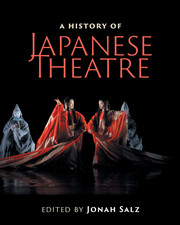Book contents
- Frontmatter
- Contents
- List of figures
- List of tables
- Contributors
- Contributors’ biographies
- Foreword
- Acknowledgments
- Note on Japanese terms
- List of abbreviations
- Timeline
- Editor's introduction
- I Traditional theatres
- Preface to Part I Japanese civilization arises
- II Modern theatres
- Preface to Part II
- III Arcs and patterns
- IV Theatre architecture
- Preface to Part IV Evolution of Japanese theatre architecture
- V Theatre criticism
- 19 Premodern practitioner principles: Zeami to Chikamatsu
- 20 Modern criticism: wrestling with Western realism
- 21 English language scholarship: a critical overview
- Interlude University scholarship and training
- VI Intercultural influences
- Epilogue: Frozen words and mythology
- Further reading
- Index
- References
21 - English language scholarship: a critical overview
from V - Theatre criticism
Published online by Cambridge University Press: 05 July 2016
- Frontmatter
- Contents
- List of figures
- List of tables
- Contributors
- Contributors’ biographies
- Foreword
- Acknowledgments
- Note on Japanese terms
- List of abbreviations
- Timeline
- Editor's introduction
- I Traditional theatres
- Preface to Part I Japanese civilization arises
- II Modern theatres
- Preface to Part II
- III Arcs and patterns
- IV Theatre architecture
- Preface to Part IV Evolution of Japanese theatre architecture
- V Theatre criticism
- 19 Premodern practitioner principles: Zeami to Chikamatsu
- 20 Modern criticism: wrestling with Western realism
- 21 English language scholarship: a critical overview
- Interlude University scholarship and training
- VI Intercultural influences
- Epilogue: Frozen words and mythology
- Further reading
- Index
- References
Summary
Since the European “discovery” of Japan in the sixteenth century, diplomats, scholars, intellectuals, and artists have been fascinated by theatrical arts witnessed or read in translation. Many undertook the task of teaching and writing about Japanese theatre for Western readers, thus creating a genealogy (of sorts) of Western scholarship on Japanese theatre. This chapter on the English-language historiography of Japanese theatre will explore how narratives, translations, and studies of Japanese theatre have intersected with larger perceptions and geopolitical positionings of Japan and the West.
Any study of such a diverse field forces scholars to impose some order. In this study, works are divided into five major eras:
1 pre-Meiji era (–1868): amateur observation
2 Meiji to World War II (1868–1945): scholarly (primarily literary) recognition
3 Cold War (1946–66): overviews of theatrical performance and text
4 postmodern revolution to bubble economy burst (1967–91): global recognition and participant-observation
5 globalization to today (1991–2013): generational conversation and an end to exceptionalism.
As with any study of this sort, these are arbitrary delineations. Not all scholarly work can be mentioned; thus this chapter will merely suggest prevailing trends and attitudes. Areas of scholarship may overlap and boundaries may blur. Despite these limitations, it is hoped that this will serve as both overview of Japanese theatre scholarship in English and guide to current trends.
Amateur description until 1868
The first Western observers of Japanese theatre were amateurs writing about performance in the context of their diplomatic or commercial visits. Under the Tokugawa shogunate's closed nation (sakoku) policy, foreigners were limited to treaty ports in Nagasaki and Yokohama; however, they occasionally saw theatre in cities such as Osaka and Edo as a part of specially arranged visits. Visitors included government officials, merchants, and/or scientists who went to the theatre as a part of their leisure time in Japan. Their diaries, letters home, and travel journals focus more on sociological description of theatre than aesthetic analysis.
The first English-language record of Japanese performance comes from the Diary of Richard Cocks. Cocks lived in Hirado, Nagasaki, from 1613 to 1623, serving as head of the British East India Company trading post.
- Type
- Chapter
- Information
- A History of Japanese Theatre , pp. 463 - 479Publisher: Cambridge University PressPrint publication year: 2016



